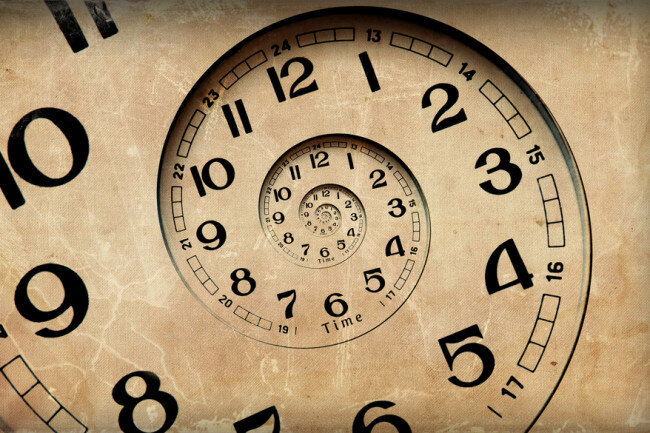So I’m less obsessed with Time as I was in “Time – Part 1”…let’s blame this on “wisdom” of getting older! J. It is however still a subject that fascinates me – especially when I come across other theories on the subject/ideas that have the potential to change my perception of this construct.
Well the novel “Einstein’s Dreams” by Alan Lightman, offers an incredible array of ways to think about time…30 to be exact that I’ve taken the liberty to summarize below:
1) Time as a circle bending back on itself (The world repeats itself, precisely, endlessly).
2) Time as a flow (like flowing water occasionally displaced by a bit of debris or a passing breeze).
3) Time having 3 dimensions with 3 perpendicular & simultaneous futures.
4) Time split in two - mechanical time & body time. (Each time is true, but the truths are not the same).
5) Time in relationship to the center of the earth (time flows more slowly the farther from the center of earth).
6) Time as an absolute and infinite ruler (lays down the law equally for all and across the universe - it is the reference against which all actions are judged).
7) Time as an acausal concept of erratic cause and effect conditions (each act as an island in time, to be judged solely on their own).
8) Time in relationship to events (time passes but little happens).
9) Time with a predetermined and defined end (a world with one month is a world of equality).
10) Time as a sticky substance (portions of towns become stuck in some moment of history and do not get out...so, too, do individuals become stuck in some point of their lives and do not get free).
11) Time as an arrow pointing in the direction of increasing order (order is the law of nature - the future is pattern, organization, union, intensification; the past is randomness, confusion, disintegration, dissipation).
12) Time as stillness, fixed and frozen especially at the center (who would make pilgrimage to the center of time? Parents with children, and lovers).
13) Time as a series of images experienced from one moment to the next.
14) Time in a world without memory, is time spent in the present - for it is only memory and habit that dulls the physical passion.
15) Time as a fitful flow in a world of changed plans, of sudden opportunities, of unexpected visions - and as a consequence, people receive fitful glimpses of the future. (thus, in this world of brief scenes from the future, few risks are taken. Those who have seen the future do not need to take risks, and those who have not yet seen the future wait for their vision without taking risks.
16) Time as a state of constant motion and a fixation on speed (in this world time passes slowly for people in motion, thus, everyone travels at high velocities to gain more time).
17) Time as flow in the reverse.
18) Time in a world in which people live just one day is too precious and organized by its relationship with light (in this world in which a human life spans but a single day, people heed time like cats straining to hear sounds in the attic - for there is no time to lose).
19) Time as one of our senses (in a world where time is a sense, like sight or like taste, a sequence of episodes may be quick or may be slow, dim or intense, salty or sweet, causal or without cause, orderly or random, depending on the prior history of the viewer).
20) Time as an infinite span in a world where people live forever (in such a world the population is split into the "Laters" and the "Nows". The former reason that in endless time, all things can be accomplished - thus all things can wait. The "Nows" note that with infinite lives, they can do all they can imagine. So they begin early, never go slowly, and move through a succession of lives - eager to miss nothing).
21) Time as a quality, not quantity, that cannot be measured (in a world where time cannot be measured, there are no clocks, no calendars, no definite appointments - events are triggered by other events, not by time).
22) Time as a line that terminates at the present, both in reality and in the mind...this is a world without a future (in a world without a future, beyond the present lies nothingness, and people cling to the present as if hanging from a cliff).
23) Time as a visible dimension (just as one may look off in the distance and see houses, trees, mountain peaks that are landmarks in space, so one may look out in another direction and see births, marriages, deaths that are signposts in time, stretching off dimly into the far future).
24) Time as a stretch of nerve fibers - seemingly continuous from a distance but disjointed close up, with microscopic gaps between fibers (so tiny are the disconnections in time that a single second would have to be magnified and dissected into one thousand parts and each of those parts into one thousand parts before a single missing part of time could be spotted).
25) Time as a pilgrimage to the Great Clock - a human invention that quantified the passage of time, that laid ruler and compass to the span of desire, that measured out exactly the moments of a life.
26) Time as a local phenomenon in which time flows at different speeds in different locations (this locality of time leads to a world of isolation which in turn yields a rich variety of life. The abundances caused by isolation however, are stifled by the same isolation).
27) Time in a future that is fixed and as an infinite corridor of rooms - one room lit at each moment, the next room dark but prepared (we walk from room to room, look into the room that is lit, the present moment, then walk on. We do not know the rooms ahead, but we know we cannot change them. We are spectators of our lives).
28) Time as the light between two mirrors, bouncing back and forth, and producing an infinite number of images, melodies, and thoughts.
29) Time in a world of shifting pasts, means events, once happened, lose reality and in time, the past never happened (the past is not as solid as this instant).
30) Time as a nightingale that flutters, fidgets, hops, jumps, and flies - mostly beyond our reach (trap one of these nightingales beneath a bell jar and time stops).
These reflections offer intellectually provocative possibilities on how one can choose to organize their time…or the possibilities thereof!
- Ayo Yusuf








